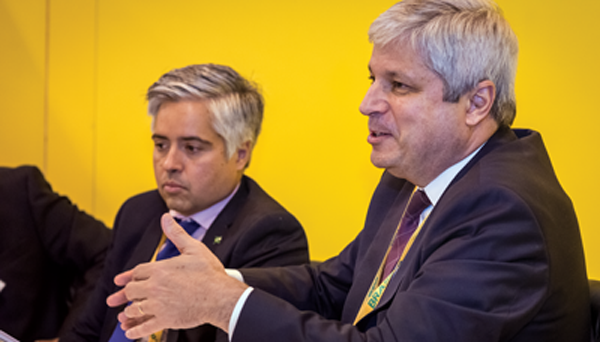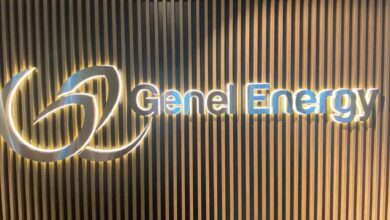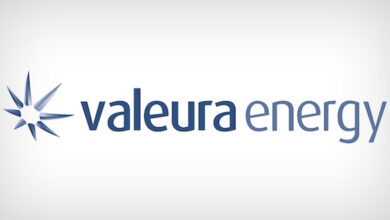Deputy Mining and Energy Minister: Open dialogue inspiring confidence in regulatory framework, taking Brazil from promise to reality

Marcio Felix: Reforms, government’s engagement with stakeholders have increased trust in Brazil, although transfer of rights issue still requires resolution
By Linda Hsieh, Managing Editor

Brazil’s fourth production-sharing round in the pre-salt, held by the National Agency of Petroleum, Natural Gas and Biofuels (ANP) on 7 June in Rio de Janeiro, raised R$3.15 billion in signing bonuses and R$738 million in planned investments during the exploration phase. The auction drew record interest from the industry. Sixteen oil and gas companies – including supermajors like BP, Chevron and ExxonMobil – took part in the auction.
Judging by the success of this licensing round, it appears that the Brazilian government’s work over the past couple of years is finally paying off. Significant reforms that have been made in the country include reductions in local content requirements, opening the pre-salt to foreign operators, renewing the Repetro tax regime, as well as establishing a multi-year calendar of bid rounds.
However, aside from these reforms, the government’s efforts to engage with the industry and stakeholders have also made a significant difference, Marcio Felix, Brazil’s Deputy Mining and Energy Minister, said.
The efforts have been made “to inspire confidence and trust,” Mr Felix said. “It’s dialogue with results and response, accepting feedback and making changes to our regulatory framework. It’s what’s happened in Brazil the last 20 months. All this change happened in less than one year and a half. Last year Brazil was a promise; now it’s a reality.”
The fourth pre-salt round saw three of four offered areas acquired: Uirapuru, Dois Irmãos and Três Marias. Décio Oddone, ANP Director General, noted at the auction that revenues expected by the federal government, states and municipalities will grow by R$40 billion over what was initially expected.
ExxonMobil, along with co-venturers Equinor and Petrogal Brasil, was the winner of the Uirapuru exploration block in the Santos Basin. The consortium offered the government 75.49% of oil after covering costs, which substantially exceeded the 22.18% minimum bid. Petrobras exercised its right to enter the consortium and will serve as operator, with 30% equity interest. ExxonMobil and Equinor will each hold 28%, while Petrogal will hold 14%.
The Três Marias block, also in the Santos Basin, was acquired by Chevron (30%) and Shell (40%) and joined by Petrobras (30%). Dois Irmãos in the Campos Basin was won by Equinor (25%) and BP (30%), also joined by Petrobras (45%).
A fifth round for the pre-salt is scheduled for 28 September and will offer the Saturno, Titã, Pau-Brasil and Sudoeste de Tartaruga Verde areas, located in the Campos and Santos basins.
Brazil’s calendar of bid rounds, which has been perceived to be among major contributors to Brazil’s market recovery and in attracting foreign investment, currently goes out to 2021. Besides the fifth pre-salt round, they also include the sixth production-sharing round, with areas in the pre-salt polygon, as well as the 16th, 17th and 18th bidding rounds under the concession regime.
Mr Felix, who took his current position as Deputy Mining and Energy Minister in April, said one of his primary and immediate goals in this role is to finalize ongoing reforms for the oil and gas industry. “There is one major challenge remaining – the so-called transfer of rights issue,” he said.
It refers to a contract that was signed in 2010 between the Brazilian government and Petrobras, giving Petrobras the right to produce up to 5 billion bbl of oil equivalent. However, since that contract was signed, Petrobras discovered double that amount in resources – approximately 10 million bbl, or even more. “Part of this belongs to the federal government, so we need to review the contract with Petrobras,” Mr Felix said. The government’s goal is to put the additional volumes out for bidding to attract additional investments into the country.

Early in 2018, the government established a commission to negotiate the terms of a new contract, and a 60-day deadline was set to reach a deal. However, no agreements had been announced as of early June, although it was reported that the parties were close to one.
Besides the transfer of rights issue, the Ministry of Mines and Energy is also working to promote onshore E&P opportunities in Brazil, mostly in mature basins and gas-prone frontier basins.
Brazil currently has 312 onshore fields, 50% of which have been producing for more than 25 years. From 2010 to 2017, the country saw a 30% decline in onshore oil production, an 80% reduction in the number of development wells drilled and 30% fall-off in oil reserves.
With its current efforts, the government aims to increase exploration activities and the number of players in frontier onshore basins, stimulating natural gas exploration. Another goal is to initiate evaluation of unconventional plays, where the government estimates there is potentially 200 trillion cu ft of natural gas resources.
Last year, ANP approved the Open Acreage Process. It consists of the offer of relinquished marginal oil fields and exploration blocks offered in past bid rounds that were not awarded or which had devolved to the agency. Rules for participation, as well as technical and economic requirements of the areas under Open Acreage, were presented in April 2018. The submission periods began on 2 May, and the offers presentation is scheduled to start 1 November.
While the fourth pre-salt bidding round was a success, Mr Felix said he’s aware that Brazil cannot rely on past successes to ensure future ones. “We need to improve and accommodate and understand. Dialogue is again the key word.” DC
Click here to read DC’s 2017 interview with Décio Oddone, ANP Director-General.
Click here to read DC’s coverage of the Brazilian market from September 2017.





